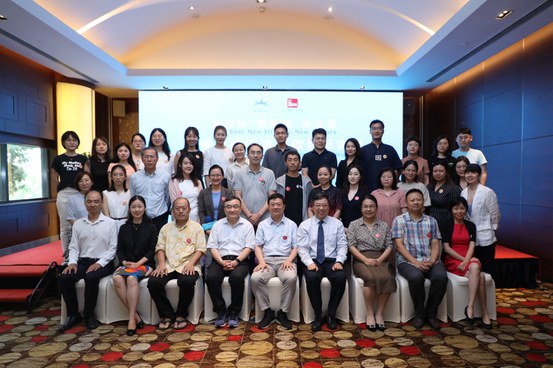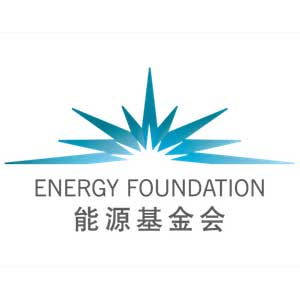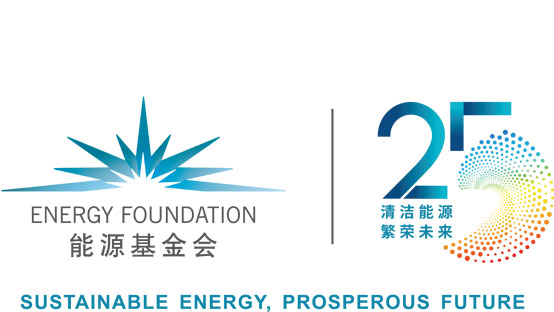Beijing Capacity Building Forum Highlighted Climate Communications
Energy Foundation China (EF China) and the China Global Philanthropy Institute (CGPI) co-hosted the “Strategic Communications College” Beijing forum entitled “New Goals, New Strategy, and a New Journey: Climate Communications for the Achievement of China’s Carbon Peaking and Neutrality Goals” in Beijing on July 18, 2021. Seventy representatives attended the forum online or in person, including those from government agencies, non-for-profit organizations, international organizations, media outlets, and academia. Through keynote speeches, roundtable discussions, and trainee sharing, the attendees discussed on such topics as how climate communications can help accelerate the achievement of China’s carbon peaking and neutrality targets in general, and how the civil society can use strategic communications to improve the public’s carbon awareness and spur their action.

Attendees of the “Strategic Communications College” Beijing forum on July 18, 2021.
Credit: CGPI
Gao LI, Director-General of the Department of Climate Change of the Ministry of Ecology and Environment (MEE), Ji ZOU, CEO and President of EF China, Feng JIA, Director-General of the Communications and Education Center, and Haoming HUANG, Professor and Vice President of CGPI, delivered keynote speeches.
Mr. Li said that setting the carbon peaking and neutrality targets was a major strategic decision made by China, and enhancing public understanding of the targets via climate communications would be vital to their success. Without solid leadership and public awareness, the targets would remain elusive, he said. Based on scientific evidence, we should use climate communications to help explain the reasons behind climate action and make clear priorities. The government and the general public need to take concerted efforts to cope with climate change. Not only governments at all levels, but also non-for-profit organizations and social organizations should spare no efforts for that matter. MEE’s Department of Climate Change would like to enhance cooperation with these organizations, so as to jointly facilitate the achievement of the carbon peaking and neutrality goals, according to Mr. Li.
Professor Zou called for the mobilization of the whole society to achieve China’s carbon goals. Carbon neutrality represents people’s aspirations for a better life, and is a crucial indicator for coordinated improvements in economic growth and quality of life, according to him. To achieve the goals, China needs to embark on an innovative development pathway that features faster economic growth with fewer greenhouse gas emissions, creates new sectors that bring about novel investment and employment opportunities, and eventually achieves the harmony of wealth, happiness, success, and sustainability in life. This new growth model embodies China’s “Green is Gold” philosophy for the future, he said.

Ji Zou gave his speech at the “Strategic Communications College” Beijing forum on July 18, 2021.
Credit: CGPI
Using his own biking experience, Mr. Jia said green mobility could be a first step for everyone’s carbon reductions action. Starting from low carbon commute and a cap for household power consumption, we could expand the eco-friendly behavior to more aspects of our daily life, he said.
Professor Huang proposed to put in place education programs to raise the awareness for climate change, saying it should be integrated into the national education system, so that the public can facilitate the achievement of China’s carbon goals.
The roundtable session of the forum was chaired by Prof. Huang, where Jun MA, Director of the Institute of Public and Environmental Affairs, Nanqing JIANG, Secretary General of the Green Circular Preference Committee of the All-China Environment Federation (ACEF) and former Programme Management Officer at the China Office of the United Nations Environment Programme, Yi LIU, National Coordinator of the Small Grants Programme of the Global Environment Facility at the United Nations Development Programme, Hepeng JIA, Professor of the School of Communication, Soochow University, Yao NI, Vice Director of the Department of International Cooperation of the ACEF, and Yuanhui CAI, Communication Manager of Greenpeace China, shared their insights on how to accelerate the achievement of China’s carbon peaking and neutrality goals via climate communications and public campaigns.
At the trainee sharing session, Jingwei HU, Senior Communications Officer of the China Youth Climate Action Network (CYACN), Liang ZHAO, Founder of Airman, and Ran ZHANG, Program Officer for Communication and Marketing at the Innovation Center for Energy and Transportation, shared their cases and reflections from the perspectives of strategic communications and public campaigns.
After launching its strategic communications capacity building programs in 2017, EF China began to partner with CGPI for the “Strategic Communications College” in 2020, with a view to advancing cooperation in the field, encouraging creativity, and enhancing narratives through capacity building and sharing of strategies, skills, and knowledge products. For the past five years, the program has provided targeted strategic communications training for over 60 organizations in the field.



